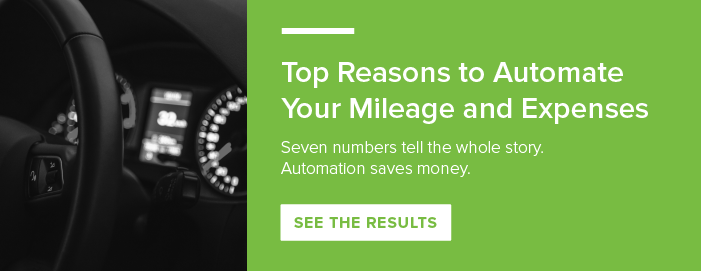For most organizations that employee a mobile workforce, the vehicle reimbursement plan may be viewed through the lens of employee benefits or budgeting. But the tools you use to reimburse drivers can also be used to increase sales productivity.
How to boost sales productivity with a mileage capture tool
A mileage log is typically used for the purposes of recording mileage for business reimbursements or tax purposes. But today's mobile apps that track business mileage using GPS technology can also serve as a powerful tool for managing and increasing sales productivity.
When your reps are traveling to meet with customers and potential customers, you want them focused on doing their jobs and not worried about whether their vehicle reimbursement will cover all their costs. So the first thing you need to do is make sure you are offering a robust vehicle reimbursement that truly covers their costs and frees them up to drive as much as needed to be fully productive.
Tip: if you are paying a taxable car allowance, your reps are probably feeling the pinch of inflation and prone to reduce driving in order to save money. Switching to a non-taxable reimbursement could boost productivity.
In addition to providing a sufficient vehicle reimbursement, you want to choose a mileage logging system that can integrate with your organization's CRM software. By tying your organization's vehicle reimbursement process to your CRM, you can maximize your employees' use of it and reap the benefits in your sales.
Adopting a CRM-integrated mileage tracking app
By choosing a mileage tracking app that integrates with your CRM, you can gain the ability to track business travel ROI.
A mobile app can automatically track mileage while recording trip details, matching addresses to clients already in the CRM system and associating new trips with these accounts. You will be able to track over time the
productivity of different reps and their trips to various customers and potential customers.
Trip data can also reveal which employees take the most efficient routes, allowing you to coach underperforming drivers with the best route planning strategies.
The best of these apps will upload trip data into an easy-to-use system with an administrator dashboard with a range of customizable reports. From here, managers can access valuable data that can be used for planning, performance reviews, and coaching of sales reps.
Increasing sales productivity via CRM adoption
Your organization's CRM software offers a powerful array of tools to manage customer data and sales. But what if your employees are inconsistent in their engagement with the software, limiting its effectiveness?
Tying your vehicle reimbursement system to your CRM is a way to solve this problem. By reimbursing drivers based on their reported mileage and using a CRM-integrated mileage tracking app to record that mileage, you require employees to use the CRM in order to get reimbursed.
In order for this to work, though, you have to choose a mileage tracking app that is easy-to-use and automates as much of the process as possible. It is important to automate the collection of most of the trip data needed to generate reimbursements and CRM inputs. Employees will then be able to embrace the change because it reduces time spent on administrative tasks.
However, it is also key to make sure that the mobile app you adopt provides privacy protection for drivers. Concerns about "big brother" and micromanagement can be a demotivator. With the right combination of privacy protection, CRM integration, and mileage capture automation, you can obtain a vehicle reimbursement tool that will be well worth the investment.
Schedule a demo today or visit our CRM mileage log page for more information.
